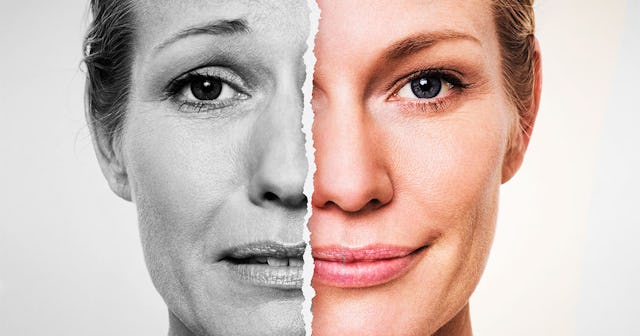I Have 'Smiling Depression' — Here's What That Means

I’ve been staring at a blank Word doc for hours — wondering what I should say. Wondering where I should begin. But if I’m being honest, I don’t know. My day began like any other. I woke just before dawn, to change and feed my toddler. To care for my 21-month-old son. When my daughter got up, I made her breakfast. Yogurt and Cinnamon Toast Crunch. And I did it all with a smile.
“Good morning, sweetie,” I said, in my best Happy Mom voice, giving her a hug and a kiss.
But it wasn’t a good morning, not for me, and it hasn’t been a good morning in quite some time. Why? Because I live with depression and I’ve spent most of 2020 steeped in sorrow and sadness. I’ve been struggling: to be, and to breathe. I fight every day for the will to live, and get out of bed.
Of course, from the outside looking in you wouldn’t know it: I get dressed daily and shower every night. I’m productive and active. I have numerous writing gigs and run more than 20 miles a week, and I laugh. A lot. My daughter makes me smile with her spunk and spirit. My son makes me laugh with his dinosaur impressions and joy of farts.
In short, I don’t look like a depression commercial. My head is raised. My hair is washed, and my teeth are brushed. I do not sit in a corner with my head in my hands, or my legs pulled up to my heart. But I don’t feel happy. I don’t know what it means to be happy, and the zest for life has been sucked out of me. I am a husk of a human. A ghost in a shell.
The unofficial term for my condition is smiling depression, or masked depression.
“‘Smiling depression’ is a term for someone living with depression on the inside while appearing perfectly happy or content on the outside,” Jamie Elmer explains in an article for Healthline. The symptoms are the same — i.e., those with smiling depression still feel helpless, hopeless, sad, and apathetic. Their appetite may be affected, and they may sleep too much, or not at all. But, as Elmer explains, “their public life is usually one that’s ‘put together,’ maybe even what some would call normal or perfect.”
However, the life of someone with smiling depression is anything but.
Each day is a battle.
Behind my smile a war rages, between my head and my heart.
And while smiling depression isn’t recognized in the Diagnostic and Statistical Manual of Mental Disorders (DSM-5), my disease isn’t any less serious. My symptoms aren’t any less intense, and my condition isn’t any less real.
Make no mistake: it’s hard to explain my depression to others. My friends see me as a loving mother. A good wife. My social media feed is full of pictures that suggest I lead a normal, happy, healthy life. But behind closed doors, I crumble. I cry in the dark — or when I’m out on a run. I often think about self-injury and self-harm. It’s something of a default. My safe space. I listen to the voices in my head, the ones that tell me I’m not good enough or smart enough. I’m not worth a damn. I also believe everyone hates me.
Friendships. Relationships. Everything feels like it is built on a lie.
So I stay busy, to avoid the truth. I stay active — to avoid my life — and I smile. I cook, clean, and play as if everything were normal. As if everything were okay. But smiling depression is dangerous. Like any mental illness, my depression is dangerous, and the risks are exacerbated by my secrecy.
Behind my mask, there are struggles.
Behind my smile, there is pain and lies.
“Depression often causes thoughts of death and suicide. But sometimes, people with clinical depression lack the energy to create a plan and follow through on completing suicide,” Amy Morin, a licensed clinical social worker, tells Verywell Mind. “While anyone with depression is at risk of suicide, individuals with smiling depression may be at especially high risk because they are high-functioning.”
The good news is, like “regular” depression, smiling depression is treatable. With therapy, medication, and lifestyle changes, those with this condition can go on to live a normal life.
As for me, I go to therapy to confront my demons. To keep the voices and negativity at bay. I take medication to manage my symptoms. To be a better person, parent, and wife. And I get up, every day — even when I don’t want to. Even when it feels like it’s all too much. I also talk about my depression, openly and honestly. Because I have to. To be well, I need to, and because I want others to know the truth: Just because I smile doesn’t mean mean I’m well. A smile doesn’t mean someone is okay.
This article was originally published on